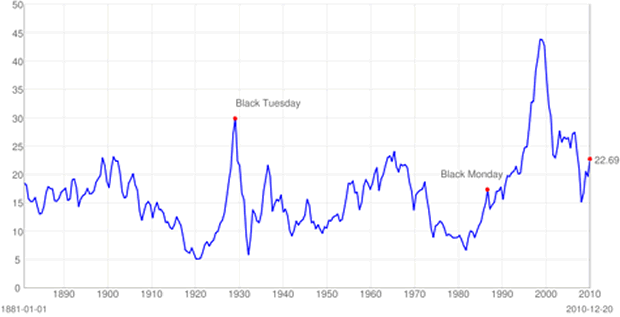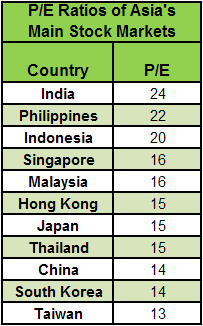Why Investing In Asia 2011 Is A No-Brainer
Companies / Investing 2011 Dec 23, 2010 - 09:04 AM GMTBy: Tony_Sagami
 China is probably the country that first comes to your mind when the subject of investing in Asia comes up. India and Japan may be close behind.
China is probably the country that first comes to your mind when the subject of investing in Asia comes up. India and Japan may be close behind.
Maybe that is a little bit my fault because those are the three countries I talk about the most in this column.
China, India and Japan offer the most American Depositary Receipts (ADRs) of all the Asian countries. While Japan’s economy has been in the doldrums for decades, China and India have been two of the fastest-growing economies in the world.
And there is a lot more growth still to come. The world’s top economists collectively expect China and India’s economy to grow by 8.9% and 8.6% respectively in 2011, according to a new poll from The Economist magazine.
The rest of Asia isn’t doing too shabby either. Vietnam and Indonesia, for example, are expected to grow by 6.8% and 6%, respectively, in 2011. That makes their growth better than any country in Europe, North America or South America.
Hong Kong, Singapore, Malaysia, the Philippines and Thailand should grow by more than 4% while Australia, South Korea, New Zealand and Taiwan are expected to grow between 3% and 4%.
The result is that you could pretty much throw a dart at an Asian map and find someplace — other than Japan — that is growing like a weed.
Hey, I know the Asian growth miracle is not a new story. Long-time readers know that I’ve been singing the Asian tune for YEARS, and that I was one of the early western investment advisors to jump on the Asian bandwagon.
A lot of my Wall Street peers have discovered Asia, particularly China and India, and have pushed up the prices in some markets.
|
All investors want to invest in dynamic, growing markets, but the most important consideration is how much you have to pay for that growth. History has shown that paying 30, 40, 50 or more times earnings is a recipe for disaster.
There is no question that China, India, and its Asian neighbors are growing, but you have to ask if those markets are overpriced or not.
Let’s take a look at the price/earnings ratios (P/E) of Asia’s main stock markets:
As you can see, India, the Philippines and Indonesia are all trading for more than 20 times earnings. On the other hand, all of the other Asian markets — Singapore, Malaysia, Hong Kong, Japan, Thailand, Taiwan, South Korea, and China are much more reasonably valued.
Lastly, let’s add a little perspective to those numbers by comparing it to the United States. Below is a chart of the historical P/E average of the S&P 500, which is currently at 22 times earnings.
While 22 times earnings isn’t the insane valuation the stock market reached in 1987 and at the height of the dot-com bubble, 22 times earnings is high by historical standards.
S&P 500 Historic P/E Ratio

Source: http://www.multpl.com/
Worse yet, you have to pay 22 times earnings for stocks in a country that is growing at a snail’s pace. Most of the “experts” expect the U.S. economy to grow by a little more than 2% in 2011. I think they’re nuts. I am firmly in the double-dip camp, so I expect the United States to fall back into a recession next year.
Recession or not, 22 times earnings is just too darn rich, and I think U.S. stocks offer one of the worst risk-reward tradeoffs of any stock market in the world.
The eight Asian markets trading for well below 20 times earnings are a much better risk-reward tradeoff because of their booming economies.
Come on, do you want to invest in China at 14 times earnings with an 8%-plus growing economy? Or in the United States at 22 times earnings with a 2%-or-less growing economy?
It is no contest in my book that the eight Asian countries selling for (well) below 20 times earnings are the best investment deals on the planet.
The easiest way to invest in those countries is through exchange traded funds. There are popular, high-volume ETFs for each of those Asian markets.
- iShares MSCI Singapore (EWS)
- iShares MSCI Malaysia (EWM)
- iShares MSCI Hong Kong (EWH)
- iShares MSCI Japan (EWJ)
- iShares MSCI Thailand (THD)
- iShares FTSE/Xinhua China (FXI)
- iShares MSCI South Korea (EWY)
- iShares MSCI Taiwan (EWT)
There are more than just one ETF for most of those markets, so you have plenty of choices. Click the following link for a list of all the Asian ETFs.
ETFs are great, but I believe, however, that you can do much better with a basket of carefully selected individual stocks because ETFs typically concentrate their holdings in the big capitalization, highly-traded stocks.
Like a big mutual fund, you’re pretty much buying the big, mature blue chip stocks instead of the smaller, rapidly-growing entrepreneurial companies.
There are a couple exceptions, however, where ETFs make more sense. Specifically, I’m talking about countries that either don’t allow foreign investors or have few individual stocks available.
Here are some examples:
- CLOSED DOOR: Taiwan allows only large institutional investors. U.S. investors are not allowed to invest directly into the Taiwan Stock Exchange.
- RESTRICTED LIQUIDITY: Vietnam requires that you leave your money in the country for at least a year. I don’t know about you, but I will not invest in anything that restricts my liquidity.
- NO U.S. OPTIONS: Guess how many Thai stocks are traded on a U.S. stock exchange? ZERO. Even the pink sheets don’t have any Thai stocks. And, there are only a few Indonesian, Philippines, and Malaysian stocks traded in the United States.
The other Asian countries — Japan, South Korea, Hong Kong, China, and Singapore — have actively-traded stocks in the U.S. marketplace and/or very welcoming policies for U.S. investors on their home exchanges.
Lastly, I’m not suggesting that you dump 100% of your U.S. stocks and put ALL your money into Asia. What I am suggesting is that you keep a healthy chunk of your equity allocation in Asia because that is where you will get the best bang for your investment buck.
Best wishes,
Tony
This investment news is brought to you by Uncommon Wisdom. Uncommon Wisdom is a free daily investment newsletter from Weiss Research analysts offering the latest investing news and financial insights for the stock market, precious metals, natural resources, Asian and South American markets. From time to time, the authors of Uncommon Wisdom also cover other topics they feel can contribute to making you healthy, wealthy and wise. To view archives or subscribe, visit http://www.uncommonwisdomdaily.com.
© 2005-2022 http://www.MarketOracle.co.uk - The Market Oracle is a FREE Daily Financial Markets Analysis & Forecasting online publication.




